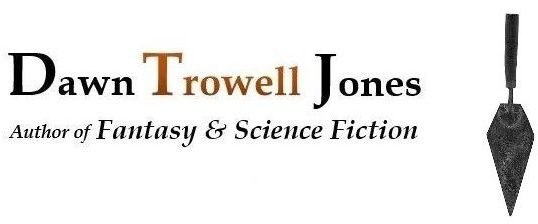 I may be biting off more than I can chew here, but hopefully, you’ll be entertained as I choke…
I may be biting off more than I can chew here, but hopefully, you’ll be entertained as I choke…
Just kidding.
Last night we watched Cosmos: Possible Worlds, Season 3, Episode 9, on Hulu, hosted by Neil DeGrasse Tyson. In this episode, he talks about a theory called “super determinism.” He leads into the idea by discussing the nature of light, as both particle and wave. The photon is the particle aspect. The wave aspect, as I understand it, has everything to do with quantum superposition. The photon’s position manifests as a result of statistical probability. The most probable event is what we perceive, and we perceive the most probable event—if I’ve got that right.
Wow. I won’t even pretend to understand the actual physics, but I’m going to play with it anyway. In fact, Tyson says, in his trademark ecstatic manner, that not understanding this stuff shouldn’t preclude anyone from using it. Great!
Here’s the rundown, then, as I understand it:
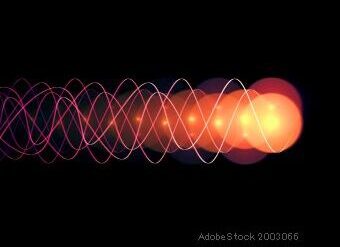 A photon is a discrete packet of energy that moves. Surprisingly, photons can split into lower-energy pairs (according to results of double-slit experiments).
A photon is a discrete packet of energy that moves. Surprisingly, photons can split into lower-energy pairs (according to results of double-slit experiments).
As I watched Tyson talk about photons, I recalled another documentary’s discussion of the journey a single photon takes from its birthplace in the core of our sun to the Earth. That journey takes an enormous amount of time, up to a million years or more, almost all of which happens inside the sun, where the photon keeps getting absorbed and re-emitted. When the photon finally escapes, it takes a little over eight minutes to reach the Earth. Crazy. So, I found it interesting, listening to Tyson, that these other documentaries talked of a single individual photon bumping around inside our sun, when it looks to me like it’s not the same photon at all, but the transference of a photon-amount of energy. But maybe I’m quibbling. Or maybe I’m missing something. I’ve probably missed something.
I’ll carry on…
So, with the above life-cycle of a photon in mind, the paired photons Tyson’s talking about must be ones that have experienced no interruption between start and finish, no interference in any way. He’s talking about uninterrupted travel. From stars, presumably. Or black holes? (My husband is shouting this from the other room.) This non-interference is relevant because photon pairs, when they occur, are entangled. That’s right: “spooky action at a distance.” And observation breaks the entanglement.
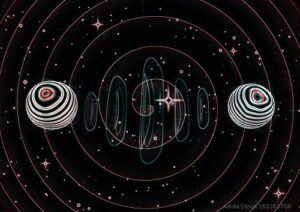 What does entanglement mean? Whatever one of the two photons does/is, which Tyson calls its “spin” (for sanity’s sake, consider “spin” a placeholder), which is to say its “information” state, remains the same or changes simultaneously with its twin. The photons don’t communicate; they’re tied. In fact, he says, some entangled pairs may have been travelling across the universe for billions of years.
What does entanglement mean? Whatever one of the two photons does/is, which Tyson calls its “spin” (for sanity’s sake, consider “spin” a placeholder), which is to say its “information” state, remains the same or changes simultaneously with its twin. The photons don’t communicate; they’re tied. In fact, he says, some entangled pairs may have been travelling across the universe for billions of years.
This BBC article by Philip Ball illustrates the trouble with observation and entanglement: “The strange link between the human mind and quantum physics.” In the Cosmos episode, Tyson never gives a good explanation of what “observation” is, which bothered me. Helpfully, the article explains why scientists are uncomfortable talking about it, that the observation at issue is probably not a mechanical interference at all, rather it’s the actual mental process of perceiving. Truly spooky! Apparently, we don’t know how to observe quantum particles without touching in this mysterious way. (With that said, can these photon pairs be interfered with and still maintain their spin, if not observed?)
You may ask: how do scientists know the photon pairs were entangled in the first place if observation breaks the entanglement and it doesn’t matter when in the sequence of time (before or after) observation takes place? Obliquely, I assume.
Interestingly, this NPR article, which I stumbled across before the episode, talks about light, too: “Scientists Discover Outer Space isn’t Pitch Black After All”. In it, Nell Greenfieldboyce describes the possibility that the blackness between stars isn’t really black at all, rather radiating with an amount of light equal to that of all the known galaxies. The universe itself may radiate light, she says, or there may be some other new and unknown source emitting the light. But I couldn’t help wondering whether the light is a reflection. A reflection that includes severed photon twins? If so, do they retain their original information/spin? I have no idea, but how fascinating it would be if we could read them in this oblique way.
 Back to the Cosmos episode: After the photon pairs, Tyson brings in “super determinism.” He suggests that the independence from space-time of these photons means our universe is not a constantly expanding multiverse of infinite vectoring possibilities, as described by the Many-Worlds Theory, but rather lies in a single, settled, and simultaneous state…
Back to the Cosmos episode: After the photon pairs, Tyson brings in “super determinism.” He suggests that the independence from space-time of these photons means our universe is not a constantly expanding multiverse of infinite vectoring possibilities, as described by the Many-Worlds Theory, but rather lies in a single, settled, and simultaneous state…
Okay, at this point, I’m really stuck on the idea that observation severs the entanglement of photon pairs. What does it mean to observe? Who’s doing the observing? Is consciousness the underlying fabric of the entire universe? Sounds a lot like “a being than which nothing better can be conceived.” Are the observed/to-be-observed parts of our universe in a collapsed state, and other parts not? Sounds like solipsism.
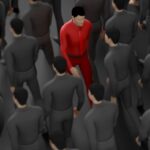 In Episode 9, after introducing super determinism, Tyson jokes, as many have, about how terrible it would be and pointless to make decisions if everything has been predetermined. Why bother? But I wish he’d tried to explain what super determinism means cosmologically as it relates to us. I mean, here’s The Matrix’s take when the Oracle speaks to Neo after he breaks the vase: “What’s really going to bake your noodle later on is, would you have broken it if I hadn’t said anything?”
In Episode 9, after introducing super determinism, Tyson jokes, as many have, about how terrible it would be and pointless to make decisions if everything has been predetermined. Why bother? But I wish he’d tried to explain what super determinism means cosmologically as it relates to us. I mean, here’s The Matrix’s take when the Oracle speaks to Neo after he breaks the vase: “What’s really going to bake your noodle later on is, would you have broken it if I hadn’t said anything?”
Is it absolutely necessary to cling to an idea of indeterminism in order to strive?
As I see us, all our worries, concerns, and efforts are integral to who we are. It’s how we’re made. Imagine an old bridge. Just because we can’t see exactly when a bridge is going to collapse, doesn’t mean the bridge won’t collapse at a particular time. But we can hope that the bridge will last a few more minutes, in time for us to make it across. From our linear-time perspective, the bridge might or might not collapse under us, so we’d better hurry.
But in a deterministic universe, according to Tyson, joking or not, hurrying makes no difference. If we’re not slated to make it in time, then we won’t.
That’s ridiculous. He must know it. A predetermined universe we cannot directly perceive has nothing to do with individual agency.
 We will always play a part. Our part. There’s no way around it. We were always going to worry that the bridge was going to collapse, and we were always going to hurry or not, for all the reasons that we did hurry, or didn’t, and the bridge is going to and did collapse for all the reasons that made the bridge collapse. They’re all connected. Our part in the makeup of the universe is that we live and function within it. We’re both cause and effect, like ripples that peter out. Or wave interference patterns. It really doesn’t matter that the universe is deterministic—if it is. And if it is, the universe is like a bubble of instantaneity, within which time-space gives shape to our lives and perceptions.
We will always play a part. Our part. There’s no way around it. We were always going to worry that the bridge was going to collapse, and we were always going to hurry or not, for all the reasons that we did hurry, or didn’t, and the bridge is going to and did collapse for all the reasons that made the bridge collapse. They’re all connected. Our part in the makeup of the universe is that we live and function within it. We’re both cause and effect, like ripples that peter out. Or wave interference patterns. It really doesn’t matter that the universe is deterministic—if it is. And if it is, the universe is like a bubble of instantaneity, within which time-space gives shape to our lives and perceptions.
We can’t take ourselves out of the equation. Our free will is part of the universe. We are choosing—and have chosen.
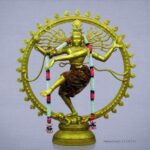 I’d argue, in answer to my question above—“Is it absolutely necessary to cling to an idea of indeterminism in order to strive?”—that striving is a linear reflection of a universe that’s more than linear. Dancing seems a better analogy. We dance. Like Shiva as Nataraja in Hinduism, who perpetually dances the universe into being.
I’d argue, in answer to my question above—“Is it absolutely necessary to cling to an idea of indeterminism in order to strive?”—that striving is a linear reflection of a universe that’s more than linear. Dancing seems a better analogy. We dance. Like Shiva as Nataraja in Hinduism, who perpetually dances the universe into being.
Indulge me for a minute here, if you will. I’m going to defend astrology for a second. Tyson would be miffed, I’m sure—if he knew. It’s a sentiment most scientists share. (He spoke of astrology in an earlier Cosmos: Possible Worlds episode.)
Based on what I’ve now learned, I can only assume that any star generating light might radiate some light in the form of paired photons, which carry the information undisturbed in different directions until affected by something—that is, “observed,” at some point in time. We’re talking about starlight. Astrologers’ deal with starlight from an Earth-bound perspective. Stars do not have “personality”, of course, as Tyson makes clear. I’m far from the most informed about astrology, but if an astrologer asserted that they did, I’d treat it as a metaphor to represent the human personality traits “tweaked” by a particular configuration of stars and planets at a particular time. In this context, references to gods and myth should be viewed as placeholders—like “singularities,” “God Particles,” and “particle/waves”—a way to look at these traits in action as they manifest in humans on Earth in a statistically discernible pattern. Maybe. If discernible.
I respect real science profoundly. I simply would rather not dismiss ancient wisdom out of hand without at least trying to imagine how it might fit within our current understanding. Science doesn’t necessarily know all the forces that travel between stars. It’s always evolving, which is wonderful, as Tyson himself has said.
Astrologers are interested in patterns. The mind is a dynamic system in a physical case, sensitive, perhaps even on the quantum level. I’d argue that it’s within the realm of possibility that there may someday be scientific support for the idea that a configuration of stars and planets at the time of a person’s birth at a particular location under the sky has an identifiable effect, a cumulative effect on behavioral patterns that’s observable—one that expert astrologers have been documenting for thousands of years.
It’s a mistake, in my opinion, to assume our ancestors were less intelligent than we are. It may be valid, however, to assume they were ignorant of much of what we know in the way we’ve come to know it. Different orientations. But I’m willing to entertain the possibility that we’re ignorant of some of what they knew. Not forever, just for now. I’m only talking about possibility, though. I’ll leave the certainty to the scientists!
But who knows? Maybe down the line, we’ll come full circle and find ancient wisdom relevant in new contexts, tied to a better understanding of the quirkiness of the physical universe. Perhaps a super-deterministic universe. Haha! Or not.
***
Take care, be safe, and have a wonderful holiday season. Thank you for reading. It means a lot to me. Signing off for 2020!
